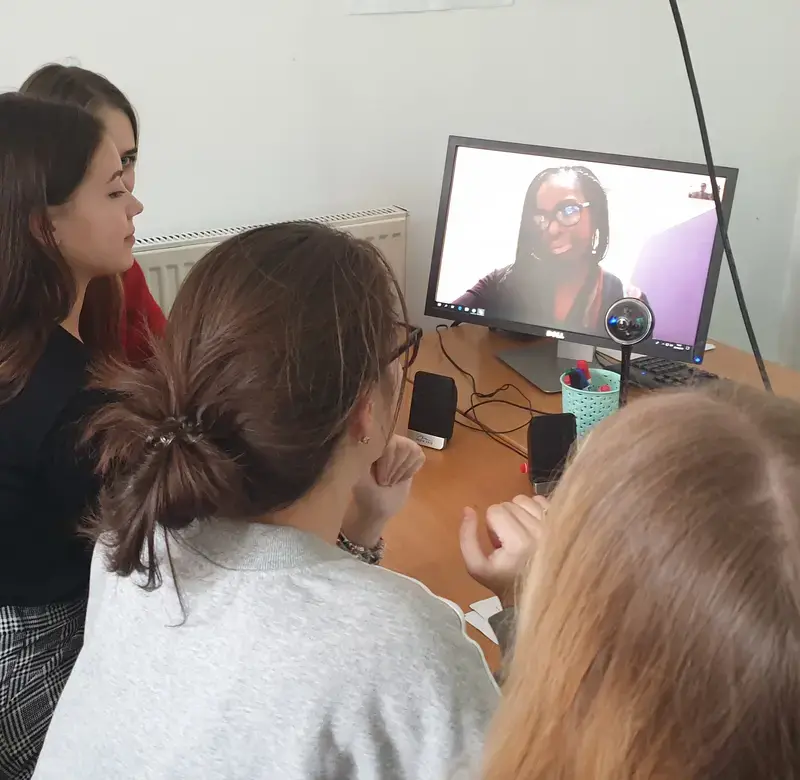Where can I access The 1619 Project?
Use these links to download the complete special issue of The New York Times Magazine, the supplementary broadsheet, and the special kids’ section as PDFs. You can also find the project on The New York Times website here, and the five-episode podcast with transcripts here.
How do I get a physical copy of The 1619 Project?
The 1619 Project magazine, broadsheet, and kids’ section are no longer available in physical form from the Pulitzer Center or from The New York Times. You can purchase a copy of The 1619 Project anthology here, and the illustrated children's book Born on the Water here.
How do I apply for The 1619 Project Education Impact Grant?
Thank you for your interest! Applications for Education Impact Grants are now open. Please visit this page to learn more about the grant program, eligibility criteria, and application deadline.
What happened to The 1619 Project Education Network?
The 1619 Project Education Network program engaged over 400 educators who continue to build on their work and utilize The 1619 Project in meaningful ways in the classroom. Though we are not engaging new cohorts at this time, our Network Alumni work with us to actively share the curricular resources they developed during the program.
Where is The 1619 Project being taught in classrooms?
Educators in all 50 states have told us they are using 1619 Project resources and associated curricular resources from the Pulitzer Center website with their students. Since the 1619 curricular resources are freely available online to anyone who wants to access them, it’s hard to determine an exact number of classrooms. We have a survey attached to the curriculum where teachers can self-report whether or not they intend to use the curriculum in the classroom. Members of The 1619 Project Education Network currently represent 21 states; you can learn more about their work here.
How are teachers using The 1619 Project in their classrooms?
Our 1619 curricular resources are meant to supplement, not replace, school curriculum. We’re seeing teachers use it in tandem with other texts and resources that align with the standards of instruction and goals for their units. We’ve seen schools and teachers who are choosing to implement The 1619 Project curricular resources be transparent with families and communities. In the situations where there has been parent concern over the material in a non-elective course, teachers offered options for students to opt out and complete alternative assignments.
Why is the Pulitzer Center working with 1619?
The 1619 Project is a collaborative and expansive work with dozens of contributors from academic, journalistic, and creative backgrounds. In addition to the subject matter itself, the project is a great tool for teaching about a collaborative, creative, multimedia approach to journalism. The Pulitzer Center gets its best feedback and ideas from teachers and our 1619 education initiatives are born out of teacher requests for this type of support and resource. We see the high interest in this project from teachers, students, and families as a response to the current moment. Protests and calls for changes to many of our government systems, the inequities in our communities that the pandemic has exposed and exacerbated, and the ongoing debates about how and what students should learn in schools all thrust the project into an important historical context. What we have repeatedly seen in classrooms we’re connected with is that engaging with The 1619 Project has been unifying and edifying for students, helping them cultivate empathy for one another in this moment.
How do The 1619 Project Education Initiatives connect to Pulitzer Center's other work?
The Pulitzer Center’s education work is designed to help students engage with some of the most important issues of our time, many of which have no easy answers. Beyond our 1619 Project materials, we have over 300 curricular resources based on reporting from all over the world, covering topics like migration, climate change, conflict, and more. Our work is intended to complement the original journalism, inspire discussion and debate, support educators’ existing curricula and goals, and help students better understand the important issues of our time and draw their own conclusions about these topics.
Does the Pulitzer Center take a position on whether The 1619 Project is accurate or whether the critics make valid points? What is your policy in the event that an article intended for the classroom contains errors or problems?
Historical scholarship, like journalism, is often fraught with controversy, as people can disagree over the meaning of historical facts. In regards to The 1619 Project, the facts are cited within the project; what we have seen are disagreements with The 1619 Project’s conclusions regarding what the legacy of slavery means to American democracy and our national identity. Since we are a news organization led by veteran journalists, it is our policy to post a correction, editor’s note, or retraction if a story on our site is found to contain factual errors.
What is your response to efforts to ban the teaching of The 1619 Project in local schools?
We find these kinds of efforts to ban The 1619 Project and other books or learning materials through legislation to be misplaced. We put faith in educators and librarians to use their expertise in creating meaningful educational experiences for students. We do know that there is research that determines ethnic studies curricula designed for diverse student groups benefit all students—students of color and white students—academically and socially. http://tinyurl.com/ResearchNEA
Does the Pulitzer Center administer the Pulitzer Prizes?
No. The Pulitzer Prizes are administered by Columbia University. The Pulitzer Center, despite bearing the Pulitzer name, is in no way affiliated with the prizes.
How can I connect with the Pulitzer Center?
The Pulitzer Center education team would love to hear from you. You can reach out about our general education programming at [email protected]. You can send questions about 1619 education initiatives to [email protected].
